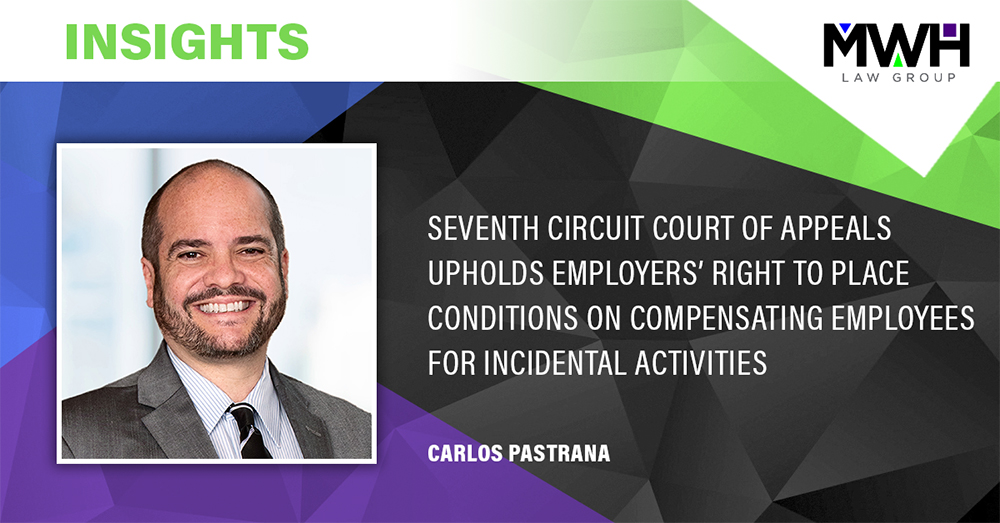Seventh Circuit Court of Appeals Upholds Employers’ Right to Place Conditions on Compensating Employees for Incidental Activities

On October 5, 2023, the United States Court for the Seventh Circuit Court of Appeals held, in Meadows v. NCR Corp., Nos. 21-3309 & 22-1383, 2023 U.S. App. LEXIS 26442 (Oct. 5, 2023), that to the extent an employer adopts a policy or practice of paying employees for so-called “incidental” pre- or post-shift activities that are not otherwise compensable under the Fair Labor Standards Act (FLSA), it can impose conditions on such pay.
The plaintiff in this case worked as a Customer Engineer (CE) for NCR, servicing the Company’s points of sale and ATMs in the field. Due to the overall nature of their work, CEs primarily work remotely, with minimal to no on-site supervision. NCR’s written policy instructed CEs to work only during their allocated hours, prohibiting off-the-clock or overtime work, and stated that pre- and post-shift activities should take only one to two minutes, and that if they were to take longer, CEs were expected to record that time electronically. CEs who worked overtime would be paid, but only if the hours were electronically entered into the Company’s timekeeping system.
In this case, the plaintiff performed pre- and post-shift activities and work activities during unpaid meal periods, including things like responding to emails and phone calls, stocking his work van with required materials for his job each day, and mapping out his work travels. However, he was only paid for the overtime that he recorded electronically. The plaintiff filed suit with the United States District Court under the FLSA and Illinois’ Minimum Wage Law, seeking compensation for his unrecorded overtime. The case went to trial, and the jury returned a verdict for the plaintiff and awarded him approximately $225,000 in unpaid overtime, plus interest and attorney’s fees. After the trial court denied NCR’s motion for a new trial, the Company appealed.
The Seventh Circuit vacated the jury’s verdict and sent the case back to the District Court for further proceedings on whether the plaintiff should get a new trial. Specifically, the Seventh Circuit determined that the District Court had erred in allowing the plaintiff to claim he was owed payment for hours he had worked but had not recorded. The Seventh Circuit described the District Court’s erroneous rationale as “since NCR chose to compensate these activities in one instance, it had to compensate them in all instances.” The Seventh Circuit specified that under the FLSA, employees can only expect to be paid for “incidental activity” if two conditions are met: 1) the employer elected to pay for such activities by contract, custom, or practice; and 2) the employee engaging in such activities complied with all the requirements imposed by that contract, custom, or practice. If NCR had any such “contract, custom, or practice”, it was a policy of paying for incidental activities only when the time was properly entered into the Company’s timekeeping system.
The Seventh Circuit specified that checking email, mapping a service route, and off-the-clock activities that were similar to those for which the plaintiff believed he should be compensated were not directly related to a CE’s principal activity of servicing the company’s equipment, and as such were “incidental” to commuting in the field. Therefore, the time was not compensable under the FLSA, and only compensable to the extent that the employee complied with the requirements set forth by the employer. The Seventh Circuit stressed that the employer, solely at its own discretion, chooses to adopt a practice of compensating employees beyond that required under the FLSA, and as such may place conditions on such compensation, such as requiring employees to record their time. Here, the requirement that time be recorded was “inextricable from the custom or practice itself” and failing to acknowledge this sort of requirement “would turn an employer’s discretion to pay for incidental activities into a trap, with the predictable consequence that employers will cease paying for incidental activities altogether.”
Since the COVID pandemic, more and more companies have chosen to allow or require their employees to work remotely. Remote or so-called “hybrid” work is likely here to stay. It is therefore crucial that employers be able to accurately record the work performed by these employees. This recent Seventh Circuit decision says that employers are well within their rights to choose not to pay employees for time that is not recorded in keeping with their policies and procedures.
Learn more about MWH Law Group’s Labor and Employment Practice Group here.

